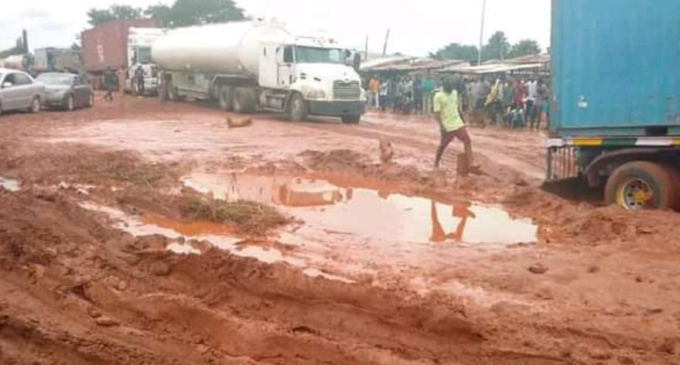Kabba-Egbe-Ilorin road: Kogi-west politicians and the shame of a constituency

Growing up as a child in Ayetoro-Gbede, the Kabba-Egbe-Ilorin Trunk-A road used to be a nightmare that every parent whose ward schooled in any of the primary schools in the town, located on the western flank of the road, had to contend with daily due to the volume of traffic on the road in those days. This was because the fear of “hit-and-run”, which was very rampant on the road in those days, was the beginning of wisdom for parents and guardians.
It was nightmarish, not because the road was pothole-ridden like most Nigerian roads of today, but because it was such that motorists could test the speed capacities of their respective vehicles on it. And that was most often done recklessly by some of them. They would travel at a maximum speed thanks to the good state of the road then, owing to the quality of the job done first by a French firm, Dumez –the company that constructed it in the mid-70s– and then others, like the Italian firm, Borini Prono, who later carried out the last major repairs on it, during Abacha’s PTF era. Crossing that road then was not for the faint-hearted as the volume of traffic from Ilorin to Kabba, and vice versa, was like every other highway in the world, connecting major towns and cities.
Scary as it was then, it was fun for us as kids to watch the flow of traffic. As kids, we would, without the knowledge of our parents or any elder in the neighbourhood, go to the main road just to sight-see the latest vehicles travelling on the road coming from, and going to, only-God-knows-where. We derived so much pleasure in it that we almost made the adventure a daily routine. This is in addition to my having to cross the road every weekday on my way to school (the Model Primary School) as a pupil in my early primary, and later secondary, school (the Community High School) days. I would still have to cross the same road going to the farm on weekends. My playmates and I, in the innocence of our childhood, savoured the cinematic splendour it offered us to the fullest. This was in the 80s through the mid-90s. In those days, crossing that road on my way to school every morning, I would always pause to watch the moving traffic. That, in my estimation as a child, looked like the “seven wonders of the world”. Do not blame me, I was just an innocent village boy then. It was like going to a cinema. Apart from the ones I watched on TV, I never knew then that a road as busy as the Kabba-Egbe-Ilorin federal highway existed anywhere.
But today, besides the fact that the current generation of kids has some more interesting things to enhance their leisure than watching vehicular traffic, the same captivating features of those days about the road have become things of the past due to lack of regular maintenance. One would struggle to convince a millennial that the road was once wearing asphalt. One would have to be pardoned for mistaking some portions of the road for a piggery.
From Egbe to Kabba, a nonagenarian would cross the road, without being assisted by a younger folk. Why? Because the traffic between Kabba and Ilorin has dried up. In fact, in some villages along the corridor where there are portions still left covered by asphalt, villagers have converted it to where they spread and dry their fresh grains and cassava. They do so with an assurance that there would be no vehicular movement for days if not months. Over 95% of the traffic has been diverted to Ekiti, Osun, and Niger states. People from Ilorin, travelling to places like Portharcourt, Aba, and Onitsha, have resorted to going through Osun, Ondo, where they connect the Lagos-Benin expressway via Ore. While those going to Lokoja follow Ekiti state, and Abuja-bound ones go through Niger state.
The current state of the road has, over the past decade, given armed robbers and their senior colleagues –kidnappers– the confidence to establish their respective regional headquarters along the road, preying on unsuspecting travellers.
With the pictures of the different portions of the road going viral on social media lately and eyewitness accounts, an armed robber or a kidnapper does not need a gun to operate. With a horsewhip, they would operate successfully as the state of the road gives no room for escape, or rescue operation unless the victim is amnestied by the captors.
Before now, Kabba to Ilorin, a journey of not more than 240 kilometres, used to take between two-and-a-half and three hours. But now, it takes nothing less than six hours, if you go through Ekiti state, which is the only alternative route, anyway. But if you are bent on seeing familiar scenes in towns along the Kabba-Ilorin road of yore, it may take you a whole day with your vehicle risking being a write-off or you spending a fortune to bring it back to shape. I wrote a piece, sometime in September 2021, captioned ‘Lokoja-Kabba-Ilorin road: Kogi west, Kwara south still part of Nigeria’, to underscore how the bad state of the road had become worse over the years. In the said article, I pleaded with the federal government to have mercy on the people of the area and consider fixing the road after over two decades of neglect.
Apart from consuming more man-hours than necessary, over 90% of the socio-economic well-being of the people is gone with the road’s motorability. Most of the communities along the route are agrarian. The farmers in those communities, then, would display their farm produce along the road for travellers to buy. The produce ranged from yam to plantain, garri, pawpaw, mango, orange, and bush meat, among others. That has been what sustained the economy of the senatorial district from time immemorial.
In the olden days, even if workers’ salaries were not paid for months, the proceeds from their farming ventures would be enough to sustain them and their families until the arrears were cleared. But that is no longer the case since close to 100% of the traffic on the road has been diverted to either Osun, Ekiti, or Niger states. Vehicles, private and commercial, travelling from Ilorin to Lokoja, Abuja, Port Harcourt, Aba, Onitsha, Markurdi, or Benin City, used to ply the road thus making it a beehive of economic activities through the interaction of the rural dwellers with travellers who wanted to buy food stuffs at relatively lower prices than they do in the urban centres.
The road served as the economic life wire of the communities along the corridor in Kogi west senatorial district, which comprises seven local government areas (Kogi, Lokoja, Kabba-Bunu, Ijumu, Mopa-Amuro, Yagba-East, and Yagbà-West), about five of which (Kabba-Bunu, Ijumu, Mopa-Amuro, Yagba-East, and Àgbà-West) are severely affected by the deplorable state of the road. Here, we are talking about one million people’s livelihoods.
People who are from these local governments by origin, but, are based in places like Port Harcourt, Kano, Ibadan, Lokoja, Lagos, Abuja, Kaduna, or Ilorin find it difficult to visit home. Considering the affinity between Kwara and Kogi state, a substantial number of “Kogites” still live and work in Kwara state but have to visit members of their extended family back home occasionally. Some who live and work in Kogi state still have their families, investments, and properties in Ilorin and therefore, have to shuttle between the two states every fortnight or month. The nodal nature of Kogi state also makes it a transit state and a gateway to the federal capital territory for people of Kwara south senatorial district, Ekiti, and (some parts of) Osun states, via that road. Meanwhile, this is a road that ought to have been dualised, considering the volume of traffic on it, before it failed completely. After all, most of the roads that have been dualised in the country are not busier than it.
The effect of the deplorable state of the road on the lives of the people in the zone has been made much worse by the Kogi state governor’s refusal to pay workers’ salaries as and when due. Those who are lucky to get paid have their salaries amputated – some get as low as 10% of their monthly salaries after they are deemed to have scaled through his never-ending “workers verification exercise”. That wicked policy does not spare the pensioners. My mom is one of them. I have had to share my meagre earnings with her since Yahaya Bello assumed office. She was not paid her pension for more than three years. Why? I was told, Bello categorised her as a ghost pensioner, seven years after she retired, as a primary school teacher. Then she started shuttling between our town and Lokoja with the little her other children and I was able to spare her for her monthly upkeep. I later had to advise her against travelling to Lokoja for Yahaya Bello’s “workers clearance or verification exercise”, after one woman from Isanlu or Mopa, I think, was reportedly kidnapped and killed by her abductors.
After about three-and-a-half years, they “cleared” and delisted my mom from their list of “ghost workers”, and she started getting less than 30% of her supposed pension every other month. Nobody is talking about the arrears of over three years that she was not paid because she is regarded as one of the lucky few to have her “status” reviewed by the benevolent “modern-day Nebuchadnezzar” currently occupying the Lugard House. Need I tell you that the less-than-30% she now gets is as irregular as rainfall in the Sahara desert? The same goes for her gratuity. There are thousands of others like her who suffered a similar horrendous fate but are not as lucky as she is. I wrote another article in March 2022 bringing to the limelight the socioeconomic torture Bello inflicts on civil servants in the state.
In some states where there is a”governor” on duty, they carry out palliative works on such federal roads with a view to getting reimbursed by the federal government later. I understand that there was a time the immediate past minister for works and housing, Babatunde Fashola announced that state governments should quit repairing federal roads, saying that the federal government would no longer reimburse whoever does. But the current state of the Kabba-Egbe-Ilorin road predated the announcement. So, a serious, responsive and responsible state government would have done something before the announcement. After all, Rivers state government just got reimbursed for some of the federal roads that have been repaired by Governor Nyesom Wike, prior to the announcement.
I won’t conclude this article without making known my feeling that Babatunde Raji Fashola, the outgone minister for works and housing, deliberately abandoned the Kogi state part of the road as a form of punishment for the people of the zone, who forced him to have an on-the-spot assessment of the road, back in 2016. The incident that happened during his early days in office as the minister for power, works, and housing. He was on a working tour of Kogi and Kwara states. His first port of call was Kogi state. When it was time to proceed to Kwara, his convoy wanted to take a detour to Ekiti so as to avoid the craters between Kabba and Ẹgbẹ́, which distance is over 50% of the journey from Kabba to Ilorin.
In the exercise of their democratic rights, the people of the most affected local governments protested, blocked the road leading to Ekiti and forced the minister to pass through Kabba-Ayetoro-Isanlu-Egbe-Eruku-Omuaran so as for him to have first-hand knowledge of what the road looks like and what the people (who have no alternative route) pass through. In his unspoken words, “What gave them the effrontery?” That explains the fact that those working on the road started from Amoyo in the Ifelodun local government area of Kwara state, and have ensured that the work progressed at such a snail speed that they have not covered up to 50 kilometres, out of about 240, since 2016 – seven solid years.
The road, therefore, from Eruku to Kabba, currently can only pass off as a grazing route for herders. That is the price people have to pay for electing clowns and charlatans as representatives at the national assembly. That is the price for having selfish, and greedy people as political leaders. One of the senators spent 12 years (three terms) being the 4th senator representing Kwara state, leaving Kogi with just two, and Kogi west with none while another spent four years acting like a palace jester, making skits, and displaying a fleet of exotic cars all over social media, releasing albums after albums without any concrete effort at lobbying his colleagues for the inclusion of the roads in any of the 16 appropriation acts passed during their combined terms in office. The two, interestingly, recently aspired to be the state governor. One was out-schemed during his party’s primary election while the other managed to secure his party’s ticket. “Kogi state don suffer, abeg!”
Even during one of the ministerial screenings in 2019, one of them clownishly asked a two-term governor of Lagos state, and a Senior Advocate of Nigeria, to recite the second stanza of the national anthem to ascertain his suitability for the post of a minister of the Federal Republic of Nigeria. Meanwhile, a smart, people-oriented, and right-thinking senator would have exploited that opportunity to drill him on the abandoned road project in his constituency to justify his wish to be returned as a minister. That has been the lot of the people of the westernmost part of Kogi West.
Now that we have a new set of federal legislators in Senator Sunday Karimi (Kogi west); Honourables Leke Abejide (Yagba-East/Yagba-West/Mopa-Amuro federal constituency); and Arch. Salman Idris (Kabba-Bunu/Ijumu federal constituency), there is a ‘renewed hope’ that the issue of the most important Trunk-A road passing through their respective, and collective constituencies will be at the front burner of their legislative agenda in the coming years with a view to making its rehabilitation a reality. A bipartisan approach among the three legislators from two different parties is what would be required to push through the agenda. Òkun people are hopeful that the trio will change the narrative and reconnect them with the rest of the country using the instrumentality of the road being fixed. This is so that people will stop having to pay far and above the necessary to travel in and out of the zone. Travelling from Ilorin to Kabba now that we have a policy of zero-fuel subsidy in full swing, cannot be less than ₦10,000 — a trip that used to cost ₦2,500.
The three gentlemen, therefore, need to appreciate the fact that the people of Kogi West deserve much more than packets of Indomie, Okada, sewing machines, ₦5,000 handouts, or 10kg packs of rice as constituency projects. The current infrastructural deficit that has come to define the entire landscape of the zone needs to be arrested and reversed.
Senator Karimi should, please, reach out to his counterpart from Kwara south, Senator Lola Ashiru, for a parliamentary collaboration to include the project in the next year’s budget. Similarly, the duo of Abejide and Idris must also do the same with Honourables Tunji Raheem Olawuyi (Ajulo-òpin), representing Ekiti/Irepodun/Isin/Oke-Ero federal constituency, and Ismail Kayode Tijani, representing Ifelodun/Offa/Oyun federal constituency, both of Kwara state, on how to work in synergy with a view to making the completion of the project a reality as soon as possible.
Meanwhile, as we await the announcement of President Bola Ahmed Tinubu’s ministerial list today if the slot for Kogi state luckily goes to someone from Kogi eest, that should only increase the chances of the road getting a look-in as the zone, at least, for the next four years, will henceforth be represented at the federal executive council (FEC) meeting where contracts are being awarded and the release of fund for projects execution approved. Hopefully, the time has come for the federal government to find a permanent solution to fixing the road that has become “the shame of a constituency”, and by extension, that of a nation.
Any time I remember the state of that road, I am always overwhelmed by the tripartite feelings of shame, sadness, and despondency. For the past eight years, every Wednesday evening at the end of the Federal Executive Council (FEC) meeting, when communiqué on the list of contracts awarded or re-awarded is being issued, I looked forward to the inclusion of the “Kabba-Egbe-Ilorin” road. It has, unfortunately, never happened. The excuse has been that there is a paucity of funds, coupled with the fact that the federal government has a lot of projects at hand. But now with more revenue, following subsidy removal, the issue of funding should not arise again.
It is my hope that this new set of federal legislators will restore our ‘membership’ of “project-Nigeria”, and citizenship of the Federal Republic of Nigeria through the reconstruction/rehabilitation of the road so that we can re-establish connection with the rest of the country, seamlessly. We have no other country than Nigeria, and our loyalty to her is unshaken.
Abubakar writes from Ilorin, Kwara state. He can be reached via 08051388285 or [email protected]
Views expressed by contributors are strictly personal and not of TheCable.













There are no comments at the moment, do you want to add one?
Write a comment